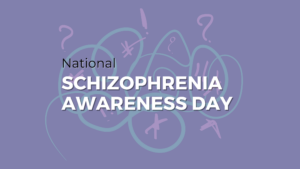By Pasha Yuen and Hannah Kerfoot 


National Schizophrenia Awareness Day takes place this year on the 25th of July in the UK. Schizophrenia is a condition often characterised by psychosis and, armed with the fact that more than two out of three people with psychosis in the world do not receive specialist mental health care, we wanted to raise awareness and learn more about the condition.
What is Schizophrenia?
Schizophrenia is a chronic mental health condition that can affect all areas of someone’s life. According to the International Classification of Disease (ICD-11), Schizophrenia is characterised by:
Core symptoms:
- Persistent Delusions (false beliefs).
- Persistent Hallucinations (perceiving something that is not real).
- Disorganized thinking (formal thought disorder).
- Experiences of influence, passivity or control (the experience that one’s feelings, impulses, thoughts, or behaviour are under the control of an external force)
Other features:
- Negative symptoms such as social withdrawal, lack of emotions and inability to enjoy daily activities.
- Grossly disorganized behaviour (unable to organise or complete any task).
- Psychomotor disturbances (uncontrollable movements or inability to move).
- The symptoms must not be a manifestation of another medical condition (e.g. a brain tumour) and are not due to the effects of a substance or medication (e.g. corticosteroids) on the central nervous system, including withdrawal effects (e.g. from alcohol).
To be diagnosed with Schizophrenia, the patient must have experienced persistent symptoms for at least one month, at least one of which must be a core symptom.
Schizophrenia is a spectrum of disorders and people with this diagnosis may experience a wide range of symptoms. It is important not to confuse Schizophrenia with Dissociative Identity Disorder (DID) – which is a common misconception, one unfortunately often portrayed in TV and films.
Removing the stigma of Schizophrenia
Without treatment the symptoms of this condition can deteriorate, sometimes very quickly. Mostly this results in the person suffering from frightening delusions and hallucinations that lead to social isolation, self-neglect and may even result in suicide. On rare occasions the individual may experience feelings that they are being attacked, leading to aggressive behaviour towards others. Sadly, these rare cases make the headlines. Combined with the inaccurate portrayal of schizophrenia in the movies, this leads to misconceptions about the nature of Schizophrenia, and the unnecessary fearful avoidance of people with this chronic condition, even when it is fully under control. The purpose of this awareness day is to increase understanding of the true nature of this illness and help to remove the stigma that people with this condition often feel.
Treatments for Schizophrenia
As with any chronic condition, such as diabetes or epilepsy, lifelong medication and monitoring are generally necessary in order to allow people with schizophrenia to live their normal life. Treatment of schizophrenia often combines both medical and talking therapies. Every individual suffering from schizophrenia has a unique experience, therefore the management of their condition must be specifically tailored to the patient’s needs.
Medication:
The initial medications prescribed by doctors are known as “antipsychotic drugs”, which help to reduce the symptoms of hallucinations and delusions. These medications can have their own side effects, some of which could be unpleasant, and may require additional medication to control. The medications may not help with all of the symptoms, so the person may still suffer from social withdrawal and difficulties with their concentration or memory. This is why the family and friends of the person suffering from schizophrenia need to support them, and encourage them to keep taking regular medication.
Although the acute psychotic episode may have ended after a short period on treatment, it is a usual practice to continue for 1 to 2 years as a prophylaxis against future exacerbations. It is important that the person should not stop taking the medicines without medical consultation, as this may cause relapse of symptoms.
Talking / other therapies:
One of the recommended talking therapies is cognitive behaviour therapy (CBT), where therapists try helping patients to cope with their symptoms and adjust to life with this chronic condition. These therapies are aimed at identifying, challenging and changing any unhelpful thoughts or behaviours.
Another type of therapy recommended for people with schizophrenia is art therapy, which is a session given by a trained professional. These therapies can help the person with schizophrenia to express their thoughts feelings in different and more positive ways.
Community support:
Trained medical staff help to monitor the progress of people with schizophrenia in their homes, and specialist social care workers may become involved, depending on the situation (e.g. if the patient has children). In the UK these are called Community Psychiatric Nurses (CPNs) and Social Workers. The CPNs can refer back to clinical specialists if they observe a deterioration in symptoms, and they can administer regular injections if the patient is unable to remember to take their medication orally. Once the person is in remission and stable on their long-term medications these visits can be less frequent.
Long term outcomes:
Unfortunately, these treatments can only improve the symptoms of schizophrenia and this is a lifelong condition for many sufferers. However, a long-term study in the UK observed that at least one in three people with a diagnosis of schizophrenia will be able to fully recover.
WHO Action
According to the World Health Organization (WHO) the worldwide prevalence of schizophrenia is 0.32%.
WHO has developed a Comprehensive Mental Health Action Plan, which addresses the actions needed to provide necessary services for individuals with mental health conditions, including schizophrenia. The aim is to ensure that 100 million more people have access to quality and affordable care for mental health conditions.
Click here to see more information on other WHO mental health initiatives, including Mental Health Gap Action Programme which is presently being implemented in over 100 WHO member states.
Education and raising awareness of schizophrenia is vital in de-stigmatising the condition. Please take this time to reflect on your own understanding of schizophrenia, and consider reading more about it in these websites: Mind , NHS & Rethink.
Watch this space for our next blogs in this series. In one blog our CMO, Dr Jones, reflects on the stories of patients she has met with this condition, and the other is focusing on the story of Clozapine, the controversial psychiatric medication.
Resources:
ICD-11 for Mortality and Morbidity Statistics (who.int)
Treatment – Schizophrenia – NHS (www.nhs.uk)
psychcentral
Recovery from psychotic illness: A 15- and 25-year international follow-up study | The British Journal of Psychiatry | Cambridge Core